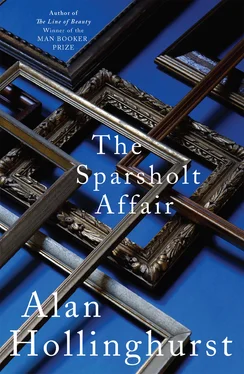Alan Hollinghurst - The Sparsholt Affair
Здесь есть возможность читать онлайн «Alan Hollinghurst - The Sparsholt Affair» весь текст электронной книги совершенно бесплатно (целиком полную версию без сокращений). В некоторых случаях можно слушать аудио, скачать через торрент в формате fb2 и присутствует краткое содержание. Год выпуска: 0101, Издательство: Pan Macmillan, Жанр: Старинная литература, на английском языке. Описание произведения, (предисловие) а так же отзывы посетителей доступны на портале библиотеки ЛибКат.
- Название:The Sparsholt Affair
- Автор:
- Издательство:Pan Macmillan
- Жанр:
- Год:0101
- ISBN:нет данных
- Рейтинг книги:5 / 5. Голосов: 1
-
Избранное:Добавить в избранное
- Отзывы:
-
Ваша оценка:
- 100
- 1
- 2
- 3
- 4
- 5
The Sparsholt Affair: краткое содержание, описание и аннотация
Предлагаем к чтению аннотацию, описание, краткое содержание или предисловие (зависит от того, что написал сам автор книги «The Sparsholt Affair»). Если вы не нашли необходимую информацию о книге — напишите в комментариях, мы постараемся отыскать её.
The Sparsholt Affair — читать онлайн бесплатно полную книгу (весь текст) целиком
Ниже представлен текст книги, разбитый по страницам. Система сохранения места последней прочитанной страницы, позволяет с удобством читать онлайн бесплатно книгу «The Sparsholt Affair», без необходимости каждый раз заново искать на чём Вы остановились. Поставьте закладку, и сможете в любой момент перейти на страницу, на которой закончили чтение.
Интервал:
Закладка:
There was a square way round to the pub by road, but halfway over the bridge Evert felt David touch his arm and they crossed to the far side – thirty seconds later he was following him down the narrow footbridge that breaks off through a gap in the parapet to the riverbank below. Evert would never have taken the towpath alone at night, it seemed even darker than the street they had left, the river nothing at first but a quick and irregular licking sound, and then, as they walked on, a broad barely visible presence, curving northwards – the sheds and chimneys of the gasworks on the far bank just beginning to show against grey cloud. It was a further little test of nerve, Evert flashed his torch with an anxious laugh, and David said, ‘Best not to use that’ – as though they might give themselves away.
At the pub they groped their way into the cheering glare of the public bar, where a few heads turned, and Evert himself stared at David with disbelief. He said quietly, ‘What will you have?’ But David seemed puzzled, not by the momentary attention of the room or by Evert’s gleaming look but perhaps by the bar itself not matching the idea he had had of it when they set out.
‘There’s another bar, isn’t there?’ he said; and after they’d peered through the door into the empty snug – ‘Let’s go in here.’ To Evert it had the air of taking a room in a hotel – he pushed the door to behind them and found he couldn’t quite look at David. They unbuttoned their coats and hung them on the stand, Evert purchased their pints of mild and bitter, and brought them over to where David was sitting, beneath the dim ceiling light, in the odd raw smell of the blackout curtains and the banked coke fire. He saw now that David had changed to come out, into old flannels and a home-knitted jersey surely made for the much smaller boy he had been two years ago. The low table had a beaten copper top, and the glass roared a little as he slid it towards him. He raised his own glass to his chin, met David’s eye, and for the first time in his life said, ‘Cheerio!’
When they left the pub they had each had three pints, and Evert found himself in the most unexpected, exciting and worrying position – he had made a huge advance, but into territory he had never dreamt of. The rush of drunkenness and the immediate return to the dark outside world made things all the more confusing and inescapable. The three pints themselves were like the acts of a drama – a strange, experimental one, spoken in fragments and murmurs, but to Evert the most intense he had known, dark with surprises and decisions; the decisions seemed almost to make themselves, in the liberty of drink and the irrefusable presence of the man he adored.
To begin with their shyness made them rush at things. The outing was David’s idea, but he hadn’t suggested it had a purpose, and to Evert simply being with David was purpose enough. Still, he heard something forced and masochistic in his own first question: ‘How’s Connie getting on in her new job?’
David looked into the barely smouldering fire. ‘Oh, all right, thanks, Evert – it’s, you know, very long hours.’ He spoke consciously as one of a couple. It was a place, a view, that Evert had never inhabited, but he took some small amusement from the frown.
‘So you don’t see much of her?’
‘It’s not perfect,’ said David, flatly stoical.
Evert left a considerate pause. ‘Still, it’s better than nothing!’ he said. David grunted and looked again at the fire. He perhaps didn’t want to talk about his private life, any more than Evert wanted to hear about it; even so, to hear about it was to move in the magic zone of his confidence, to be privy to his secrets. ‘I wasn’t quite clear the other night what she’s actually doing. She’s . . . well, she’s so bright!’
‘Oh, aye,’ said David, as if that were both a proud fact and a bit of a problem. Was it possible something was wrong, there was some intimate obstacle with which he needed help? He spoke bluntly, as though impatient with Evert for not knowing: ‘Well, you know she’s at Blenheim Palace, she’s working there.’ For a second he had the glare of efficiency, he was the soldier in mufti, the opposite of Evert, the essential civilian; who said,
‘Ah, yes, I see,’ though in fact it was mere rumour to him what was going on at Blenheim. He sensed he’d missed hints before.
‘Along with our friend Mr Green,’ said David.
Evert said, ‘Quite so . . .’ as if discreetly concealing his own knowledge of this confidential matter. He was surprised, and pleased, by that cool ‘Mr Green’. Then he found David was giving him a sly but rather beautiful smile, and he held his gaze for as long as he could, and then looked down in confusion. He wasn’t sure what had happened, but he hoped to take advantage of it.
Evert of course couldn’t judge how David saw their evening going – perhaps just a pint and then a quick walk back to College. He loved sitting close to him, looking at him as much as he liked, laying his hand on his arm now and then to make some amusing point – the smoky drabness of the bar was to him a golden privilege . . . but it was painful too, because it forced a recognition: he was his friend now, but he would never be more. As Evert finished his beer David stood up and said, ‘The same again, then?’ as if in his view the evening was going well – perhaps only just getting started. There was the same small fraction of play-acting, as there was in his being engaged, or at other times in rowing kit. Evert watched him at the bar, the old flannels tight too around his over-developed backside and thighs, and almost worn through under his seat – he was standing a drink but it was obvious he had very little money.
It was only when David sat down again that Evert saw he had something particular on his mind, and thought for a second it might be some gentle but awful rebuke, and that their first time alone together was designed exactly to be their last. ‘Cheers!’ said David again. ‘So you haven’t heard about my bit of trouble?’
‘Oh, no!’ said Evert. ‘Back home, do you mean?’
‘Not that, no – though that’s pretty bad’ – and he seemed ready to talk about the air raids instead, but stopped himself: ‘No, I mean this business in College.’
‘I haven’t heard a thing,’ said Evert, sounding slightly indignant. A number of ideas appeared to him like figures glimpsed in a room before the door is shut. ‘What is it? – if you want to tell me, that is.’ He thought it would be very hard after that for David not to.
David glanced at him with a quick provisional smile and took a swallow of beer before he answered. ‘I’m in trouble with the Censor.’
‘Oh, yes . . . ?’
‘I didn’t know the ropes, you see – I see that now.’
‘Ah,’ said Evert, pretending even to himself he didn’t see what was coming. But then, ‘You mean to do with Connie?’
David pursed his lips and nodded. Was he going to make Evert come out with it for him? ‘I see,’ said Evert, feeling there was still some welcome ambiguity.
‘Yep,’ said David, and drank some more. ‘No, what happened, if you want to know, was that my scout came in first thing two days ago and found us together. And he’s reported me to the Censor. He’s never liked me, since that business with Sangster downstairs – well, you wouldn’t know about that.’
‘The scout hasn’t, you mean . . .’
‘Well, or the Censor.’ It was that baffling idea, for Evert, of anyone not liking Sparsholt, or giving him the widest licence.
‘So what did the Censor say?’ Evert found he was picturing the moment of discovery, the threshold of the blacked-out bedroom where he himself had first met Gordon Pinnock. He was appalled to think David might be about to leave in disgrace, never to be seen again. ‘He can’t send you down for that,’ he said, in solid defiance of the truth.
Читать дальшеИнтервал:
Закладка:
Похожие книги на «The Sparsholt Affair»
Представляем Вашему вниманию похожие книги на «The Sparsholt Affair» списком для выбора. Мы отобрали схожую по названию и смыслу литературу в надежде предоставить читателям больше вариантов отыскать новые, интересные, ещё непрочитанные произведения.
Обсуждение, отзывы о книге «The Sparsholt Affair» и просто собственные мнения читателей. Оставьте ваши комментарии, напишите, что Вы думаете о произведении, его смысле или главных героях. Укажите что конкретно понравилось, а что нет, и почему Вы так считаете.












